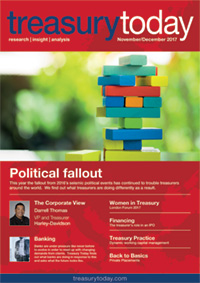Do treasurers dream of electric sheep?
Is the world speeding up? Here we are, in the last two months of a year that has seemingly passed by in a flash. We know the world is not spinning any faster, but the pace of life has increased exponentially over the past decade. As a result, we have all become time-poor, spending our days feeling rushed and, perhaps as a result, demanding instant gratification.
The change in pace of life is having a big impact on how businesses operate. Where once most businesses could operate within a restricted set of hours, today they must be open and trading 24 hours a day, seven days a week.
The treasury department, which is managing its own increasing workload, has largely been able to avoid the need to be on call 24/7 – calls with colleagues in different time zones excepted. This is all beginning to change though, as the world of finance moves from batch to real-time, and faster payment systems and real-time data exchange become the norm.
What does this mean for the treasury? According to experts that Treasury Today spoke with at EuroFinance, it could mean the arrival of the 24/7 treasury desk, the rationale being that in the batch-world, if things go wrong they go wrong within a certain time. Issues in the real-time world wait for no one.
Of course, treasurers cannot work without sleep. In any case, in an era of belt-tightening, corporations are unlikely to pay an ‘out of hours’ treasury team to operate the department.
So, what might be the answer? One banker suggested that we could see a return of the banks offering outsourcing services, stepping in and playing the role of ‘out of office treasurer’.
With increasingly complex algorithms powering ever-more sophisticated AI and machine learning tools, treasurers could establish the rules under various circumstances and leave the banks to execute these on their behalf. In theory, it seems like a reasonable idea. In practice, this potentially raises more questions than it answers – more importantly, would you trust another institution to run your treasury overnight?
And consider this: if the outsourcing arrangement works that well, then why wouldn’t corporations shift more treasury activities to the banks? The dystopian vision of a single treasurer acting as a mere overseer of the machines will become a reality.
Of course, these ideas are formed through the lens of today. Who knows what consumers, businesses, treasury departments and banks will look like in a decade? But what is certain is that the emergent ‘intelligent’ treasury technology will pose a host of interesting questions, not least about who or what the treasurer of the future will be. It is now time to start thinking about the answers.


